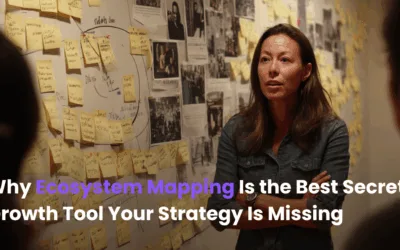Over the last several years, I’ve seen literally thousands of startups pitch their products, and I’ve been personally involved in training many hundreds of teams in the development of their ideas. I’ve seen it all – passionate founders who are excited about changing the world, determined founders who are single minded in their pursuit of funding, inspiring founders who create ingenious solutions, and ambitious founders who want to disrupt major players in their space.
None of those founders got into startups because they thought it would be easy. All of them have committed time, money and effort into something they believe in.
Success in startups is a rare thing. It requires that commitment and that passion, certainly. But pragmatically, it requires some other basics which often get overlooked in the development of a successful startup.
I have invested in startups in the past, and I will continue to do so. But I don’t want to focus on investment in this post. I want to speak as a facilitator in startup programs and as someone who has worked with many founders to plan the future of a company. Because I think we might actually all be getting it wrong when it comes to what’s needed in startups. And I think the focus on investment is a major factor in that error.
So I want to talk about what I look for in a startup and why I think we may need to rethink the way we are building startups – from the ground up.
The product has a market
There’s a stark reality about startups which doesn’t get enough attention. Only 1 in 10 startups make it past the five-year mark.That failure rate has been pretty consistent for decades. No amount of accelerator programs or incubators or investment planning has actually shifted that failure rate.
Now to some extent, this is actually a good thing. We actually need some ideas to fail. This is why basic research exists. It’s great to come up with ideas, test them and chuck them out when they don’t meet the needs of a buyer, or it doesn’t solve a problem worth solving. .
But we are not treating startups like basic research at all. We don’t chuck out bad ideas before wasting money on something that isn’t going to survive. Instead so many startups jump straight into investment without having done what is needed to check if their idea meets the Holy Trilogy of validation – feasibility (it works), viability (it’s cheaper than the current ways of solving a problem) and desirability (sufficient people with buying power actually want the solution, and there’s a scalable market for the product).
So the number one thing I am looking for in a startup is a team prepared to validate that there’s a sufficiently scalable market for their product. Teams have to be prepared to listen to their buyers – not the end users, not even necessarily the beneficiaries, but actually to the people paying for the product. Most importantly they shouldn’t start by trying to sell their product. They should be focused on the problem space, rather than on a sales pitch.
There’s a marketing plan and a go-to-market strategy
Oh my word, how often have I heard the line from investors and entrepreneurs that you can buy in marketing support. Let me make this clear: if you are a startup, you can’t. Until companies are generating enough business to bring on an agency to handle marketing, founders need to prepare their own marketing plan and strategy.
Now most founders would not know a marketing strategy if they fell over it. It’s not their fault. They didn’t study marketing at uni. They don’t know how to develop customer personas, or build a customer journey map and then craft their product around validated customer journeys. They don’t know how to segment the market, or how to build revenue opportunities through automated content marketing and brand awareness building activities.
It’s a complex and multifaceted activity. And this is why people tell founders to buy that in. But the problem with outsourcing marketing and go-to-market strategy to an agency is twofold: it’s expensive and it’s a dark art. So founders really don’t understand why they might be selling well in one market and not in another. Startups that enter the market with an underdeveloped go-to-market strategy are ill-equipped to reach their target audience effectively, and they can fail simply because they don’t know how to acquire and retain customers.
So the number two thing I am looking for in a startup is a team that has a marketer on board as part of their team. This isn’t hard. There are countless marketing graduates who know how to build a go-to-market strategy coming out of universities and TAFE colleges and looking for work, or doing postgraduate study. There are thousands of contract marketers who might be interested in joining a startup on a part time basis. Founders need to attend events where these marketers may be discovered, or to engage with their local institutions and find someone with the skills they need to join their team. It is absolutely imperative to realise that a lack of focus on real-world sales, customer feedback, and market fit is a recipe for startup failure that no amount of funding can fix.
The pitch matters but a good pitch doesn’t make a successful business
It’s easy to get caught up in the theatre of the perfect pitch. Founders often spend countless hours refining their presentation, crafting the ideal narrative, and rehearsing their pitch deck until every slide feels flawless.
And look, I do understand that pitching skills are needed. Anyone who runs a business knows that they have to pitch effectively their whole lives – to sell goods and services, to attract talent and to achieve investment.
But any founder that prioritises a pitch over a sustainable business model is missing the point of their business. It speaks volumes that of the 1 in 10 startups that survive beyond five years, a very significant percentage of those successful startups actually bootstrapped. That is, they got no investment at all.
They actually sold their products. That’s what made them a successful business. That’s actually what matters.
The word ‘traction’ is often thrown around in pitches as if users or initial conversations are evidence of a startup’s success. But traction really refers to sales. What’s your actual revenue? Even if your product is in development hell because of clinical trials or because it costs a fortune to build your product or distribution process, there are still ways to generate revenue from selling services or adjacent products long before you get to take your primary product to market.
And it should come as a shock to no-one that investors are seeking companies that are actually selling their products. Revenue is an awfully good sign of a good investment bet. So the number three thing I am looking for in a startup, is a team that prioritises sales pitches over pitching for investment.
The team matters
You’ve heard it time and again; investors are looking for teams over products. Yes, they are. And it almost seems like magic. Or worse, some kind of romantic (bromantic?) force of attraction for the startup founder.
Trust me, I’ve seen some very charismatic founder stars. And it’s true: they can convince investors to invest. I’m just not sure that’s a good thing. In my time, I’ve seen fairly unimpressive returns on investment for startups who rely on a charismatic leader to drive growth. And I’ve also come across some highly charismatic founders who are actually psychopaths.
Again, much like the pitch, charisma among founders and team members can be useful, but that’s not what matters most in a team.
What matters is diversity. Too often, startup teams are small and made up of individuals who share similar backgrounds, skills, and perspectives. While this might create a sense of comfort and cohesion, it often leads to blind spots, groupthink, and missed opportunities to innovate and adapt.
A good team will embrace diversity as a strategic advantage. They will listen to one another and work collaboratively as a team, respecting their differences and leveraging their skill sets to deliver quality customer experiences of their products.
I said earlier I look for a marketer in every team. The reality is I look for much more diversity than that. So the final thing I am looking for in a startup is a diverse team. For me, that means the team contains representation in the team from what we call the 4 Hs of a hackathon – a hustler (sales and marketing skills), a hipster (designer), a hacker (builder/developer) and a humanitarian (someone with lived experience of the problem, or a domain expert). I also like to see diversity in terms of gender, age, ethnicity and experience of disability. Because when you have all that in a team, you are less likely to make mistakes in targeting customer segments.
Wrapping it up
Of course this is just the tip of the iceberg. I actually think there are a number of other characteristics that I look for in a startup, including integrity, ability to recognise appropriate investment sources (including corporate investment or debt equity), and sheer coachability. But I think the four items I’ve listed above might be news to many founders just starting out, or even those emerging from long corporate careers.
I think we need to look at startup development programs a little differently. Startup success hinges on so much more than a good pitch to secure investment. It requires a relentless focus on validating the market, crafting a viable sales strategy, and building a team that can navigate the complexities of the markets they wish to engage. To foster greater success among startups – essentially to create sustainable and thriving businesses that actually contribute to economies – we need to build teams, skills and products that may benefit from investment, but may not actually need it.



